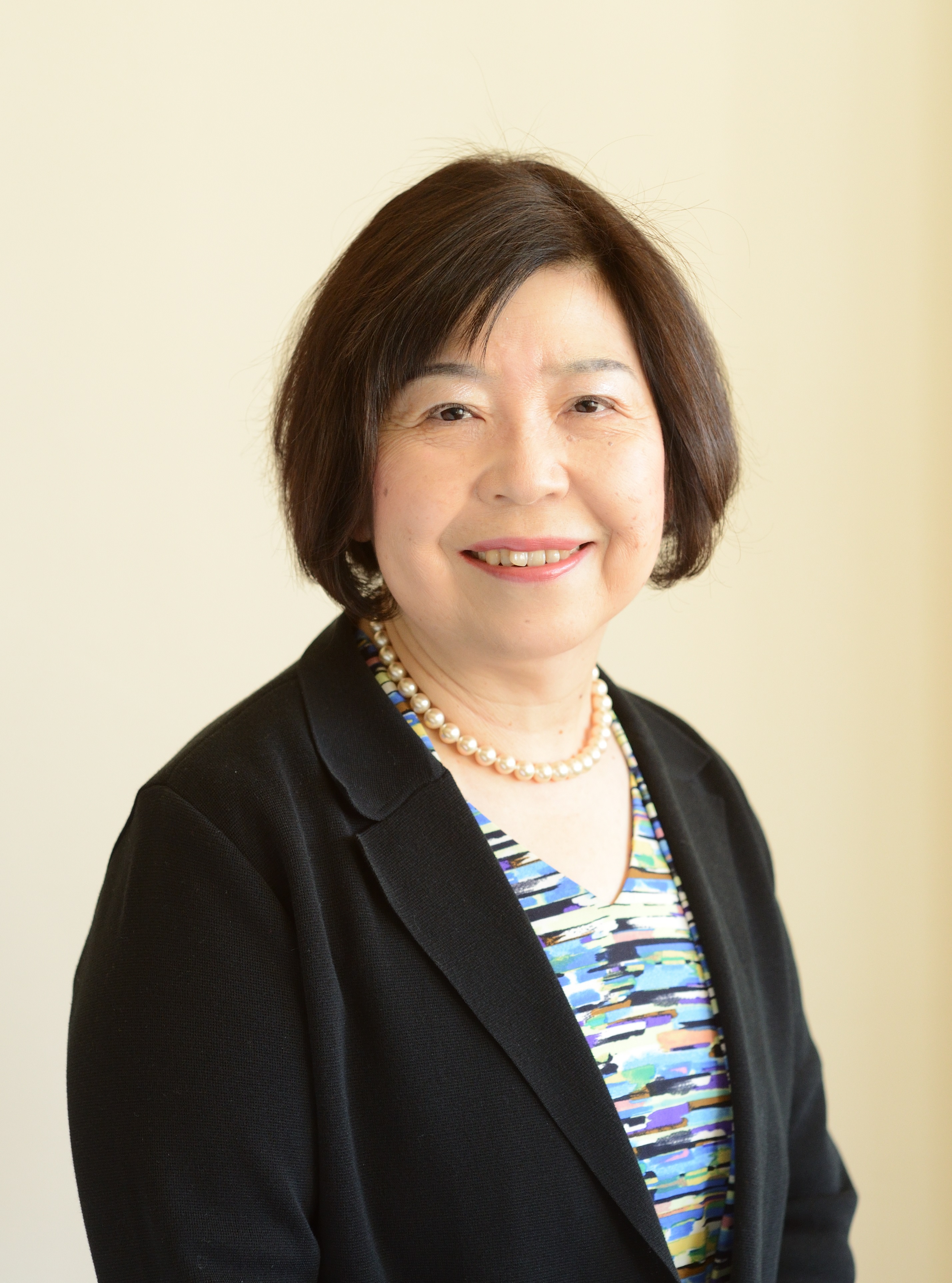国際教育学部 学部長挨拶

国際教育学部こども教育学科
学部長 太田 雅子
国際教育学部こども教育学科においては、新しい時代に求められる資質・能力を子どもたちが身につけられるよう、2021年度からIB関連の科目を開講し、主体性や国際的な視点を持った全人教育を推進します。IB教育は、知識や人格のバランスがとれた、世界的に通用する人材を育成することを目的としています。また、文部科学省が掲げる「生きる力」やこれからの時代に求められる「自ら探究する学習者」の育ちを支えるカリキュラム・具体的方法を提示しています。
IB教育の目標は、「すべてのIBプログラムは、国際的な視野をもつ人間の育成を目指しています。人類に共通する人間らしさと地球を共に守る責任を認識し、より良い、より平和な世界を築くことに貢献する人間を育てます。」です。また、IB教育の特色のひとつは「社会的構成主義アプローチ」を教育方法論として用いていることです。それは、古典的な学習観、すなわち知識や能力を、物を器に入れるように、頭に入れこむものとしての捉え方とは反対の考え方です。
学習は個々の頭の中でなく、活動の参加者の間で、相互作用的に構成されるものであり、個人の学習は、知識や能力の量的増大ではなく、全人格的な成長・変容であるとしています。子どもが学習の過程において、自ら探求することを奨励しています。探究とは、子どもの理解が現時点でのレベルから、新しい、より深いレベルへと移行するプロセスであり、教師の援助・指導を受けつつ子ども主体で行われるものです。
IBの子ども観・教育観は、子どもは有能な学び手であり、豊かな環境があれば豊かな学びがあり、育ちがあるというものです。そして、子どもが主体であり、教師はファシリテーターとしての役割を担います。ファシリテーターは、子どもが遊びや活動の中で実現したいことができるよう支援し、方向づけ、環境を整えます。個々の子どもが「どんな願いを持っているのか」、「どの方向に向かおうとしているのか」を把握します。遊びや活動が進まなくなってしまった時は、子どもと会話し、ヒントを与えるなどして気づきを得ることができるように、やりたいことを実現するようにサポートします。
国際バカロレア教育に影響を与えた人物にボイヤー(Ernest L. Boyer)がいます。ボイヤーは、「一人一人は個性的・ユニークな存在である。豊かな可能性を持ち、尊重されるべきである。それによって自信や自己肯定感が育まれる。」と述べています。「お互いのよさを認め合い、存在を喜び合うことが大事である。個々は繋がり合って、コミュニティーの中で学び・育つ存在である。」と考えています。成績ではなく、人生の質が大事であると説明しています。こうした考えは、本学の教育理念である「生命の尊厳と隣人愛」と共通しています。
新しい時代の新しい教育に向けて、一緒にチャレンジしてみませんか。
IB教育の目標は、「すべてのIBプログラムは、国際的な視野をもつ人間の育成を目指しています。人類に共通する人間らしさと地球を共に守る責任を認識し、より良い、より平和な世界を築くことに貢献する人間を育てます。」です。また、IB教育の特色のひとつは「社会的構成主義アプローチ」を教育方法論として用いていることです。それは、古典的な学習観、すなわち知識や能力を、物を器に入れるように、頭に入れこむものとしての捉え方とは反対の考え方です。
学習は個々の頭の中でなく、活動の参加者の間で、相互作用的に構成されるものであり、個人の学習は、知識や能力の量的増大ではなく、全人格的な成長・変容であるとしています。子どもが学習の過程において、自ら探求することを奨励しています。探究とは、子どもの理解が現時点でのレベルから、新しい、より深いレベルへと移行するプロセスであり、教師の援助・指導を受けつつ子ども主体で行われるものです。
IBの子ども観・教育観は、子どもは有能な学び手であり、豊かな環境があれば豊かな学びがあり、育ちがあるというものです。そして、子どもが主体であり、教師はファシリテーターとしての役割を担います。ファシリテーターは、子どもが遊びや活動の中で実現したいことができるよう支援し、方向づけ、環境を整えます。個々の子どもが「どんな願いを持っているのか」、「どの方向に向かおうとしているのか」を把握します。遊びや活動が進まなくなってしまった時は、子どもと会話し、ヒントを与えるなどして気づきを得ることができるように、やりたいことを実現するようにサポートします。
国際バカロレア教育に影響を与えた人物にボイヤー(Ernest L. Boyer)がいます。ボイヤーは、「一人一人は個性的・ユニークな存在である。豊かな可能性を持ち、尊重されるべきである。それによって自信や自己肯定感が育まれる。」と述べています。「お互いのよさを認め合い、存在を喜び合うことが大事である。個々は繋がり合って、コミュニティーの中で学び・育つ存在である。」と考えています。成績ではなく、人生の質が大事であると説明しています。こうした考えは、本学の教育理念である「生命の尊厳と隣人愛」と共通しています。
新しい時代の新しい教育に向けて、一緒にチャレンジしてみませんか。
The Department of Child Education in the School of International Education offers IB-related courses starting from 2021 to promote whole-person education with learner autonomy and a global perspective so that children acquire the qualities and abilities necessary in this new era. IB education aims to develop world-class human resources with a good balance of knowledge and personality. It also provides specific ways to foster a “zest for living” (Ikiru Chikara in Japanese), as advocated by Japan’s Ministry of Education, Culture, Sports, Science and Technology (MEXT), and support “self-directed discovery learning”, which is required for the future.
The goal of IB education is “The aim of all IB programmes is to develop internationally minded people who, recognizing their common humanity and shared guardianship of the planet, help to create a better and more peaceful world.” One of the characteristics of IB education is that it uses a "social constructivism approach" as an educational methodology. It is the opposite of the classical view of learning, that is, knowledge and ability as something that is put into the brain as if it were put into a container.
Learning is composed interactively among participants in the activity, not in the individual minds, and individual learning is not increasing the knowledge and ability quantitatively but the growth and transformation of the whole personality. It is encouraged that children explore themselves in the process of learning. Inquiry is a process by which children’s understanding shifts from the current level to a new, deeper and deeper level, with the help and guidance from teachers.
The IB's view of children and education is that children are talented learners, and if there is a rich environment, they can learn and grow up. Also, children are the core in the learning and teachers play the role as facilitators. Facilitators assist, direct, and prepare the environment for the child to do what he or she wants to achieve in play and activity. Also, they understand the wishes each child has and the direction they are heading. When play and activity is stuck, facilitators support the children to realize what they want to do by communicating with them and giving hints (scaffolding).
One of the people who influenced IB education is Ernest L. Boyer. Boyer believed that "Each person is unique. They have a lot of potential and should be respected. It fosters self-confidence and self-affirmation." He also believed that "It is important to recognize each other's strength and rejoice together. Individuals are connected, and learn and grow in the community." He explained that quality of life is more important than grades. This idea is similar to Seirei Christopher University’s educational philosophy of "Dignity of Life” and “Love Thy Neighbor".
Join us and challenge yourself with a new approach to education for a new era.
The goal of IB education is “The aim of all IB programmes is to develop internationally minded people who, recognizing their common humanity and shared guardianship of the planet, help to create a better and more peaceful world.” One of the characteristics of IB education is that it uses a "social constructivism approach" as an educational methodology. It is the opposite of the classical view of learning, that is, knowledge and ability as something that is put into the brain as if it were put into a container.
Learning is composed interactively among participants in the activity, not in the individual minds, and individual learning is not increasing the knowledge and ability quantitatively but the growth and transformation of the whole personality. It is encouraged that children explore themselves in the process of learning. Inquiry is a process by which children’s understanding shifts from the current level to a new, deeper and deeper level, with the help and guidance from teachers.
The IB's view of children and education is that children are talented learners, and if there is a rich environment, they can learn and grow up. Also, children are the core in the learning and teachers play the role as facilitators. Facilitators assist, direct, and prepare the environment for the child to do what he or she wants to achieve in play and activity. Also, they understand the wishes each child has and the direction they are heading. When play and activity is stuck, facilitators support the children to realize what they want to do by communicating with them and giving hints (scaffolding).
One of the people who influenced IB education is Ernest L. Boyer. Boyer believed that "Each person is unique. They have a lot of potential and should be respected. It fosters self-confidence and self-affirmation." He also believed that "It is important to recognize each other's strength and rejoice together. Individuals are connected, and learn and grow in the community." He explained that quality of life is more important than grades. This idea is similar to Seirei Christopher University’s educational philosophy of "Dignity of Life” and “Love Thy Neighbor".
Join us and challenge yourself with a new approach to education for a new era.




